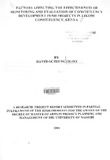| dc.description.abstract | Although Kenya has pursued economic development through central planning since independence in 1963, the centralization of authority and management of resources has led to inadequate distribution of resources across regions. A substantive decentralization policy came in 1983 with the adoption of the District Focus for Rural Development (DFRD) strategy which aimed at enhancing geographical equity where funds were allocated to less developed districts. The Constituency Development Fund was created in 2003 out of the desire to achieve Community Driven Development where the local communities generate their own development agenda and get it funded by the central government.
Unlike other devolved funds that go through several bureaucracies, the funds under this program go directly to the local level. The research sought to find out the factors affecting the effective monitoring and evaluation of projects under this fund. The research had five guiding objectives. These were: To determine the influence of level of training, budgetary allocation, stakeholder participation, politics and institutional framework on effective monitoring and evaluation of CDF projects. A descriptive survey research design was used to collect primary data.
The questionnaire was pilot tested so that the anomalies were corrected. Qualitative data was also collected which provided adequate clarifications on some aspects of the primary data. The research purposively targeted 31 respondents, 27 of Whom were Project Management Committee members responsible for monitoring and evaluation of CDF Projects according to the CDF Act (2003). The rest were officials charged with responsibilities for prudent management of this fund. A census was done involving all the respondents. Descriptive analysis of the data collected was mainly done in narrative form using descriptive statistics and tables as appropriate. The results agreed with other similar studies done previously.
The research established that there were several factors affecting effective monitoring and evaluation of Constituencies Development Fund. These included lack of training of those tasked with monitoring and evaluation activities and unclear institutional framework for conducting the same, Other factors included not incorporating monitoring and evaluation budget into project budgets, limited involvement of primary stakeholders and political interference.
The study recommends training of the various committees involved in monitoring and evaluation to arm them with requisite skills and improve communication of data, defining clear structures for monitoring and evaluation including an appointment of monitoring and evaluation personnel, delineation of monitoring budget from capacity building, involvement of primary beneficiaries at all stages of the project cycle other than conceptualisation and limiting political influence in the CDF projects. The study also recommends further research to establish whether monitoring and evaluation is effective in other sectors covered by the CDF like Health and Water other than Education. Other research ::011Id also look at modalities of strengthening primary stakeholders in order to optimize their participation in monitoring and evaluation of projects. | en_US |

